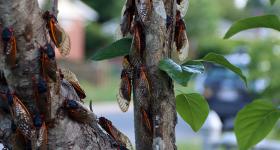Ten scholars from an array of disciplines were recruited by the university to join Columbian College’s roster of permanent full-time faculty members this year.


Ten scholars from an array of disciplines were recruited by the university to join Columbian College’s roster of permanent full-time faculty members this year.

Live From the Mall: CCAS Class of ’24 Shared Memories at Commencement
In the shadows of the Washington Monument on Commencement Day, members of the CCAS Class of 2024 shared stories about their friends, their faculty and how their university experience helped shaped...

Two GW Students Earn Civic Fellowships for Commitment to Public Service
Recipients Bongani Ndebele and Lauren Patrick have been heavily involved in civic engagement projects through the Honey W. Nashman Center while at GW.

GW Scholars Honored with Fulbright Fellowships
Four Columbian College faculty members were offered research opportunities with the distinguished Fulbright U.S. Scholar Program.

New Endowment Memorializes Beloved Professor’s Impact
History and Classics’ Professor Diane Harris Cline was remembered as a devoted educator. A gift honoring her legacy will aid students.

Cicadapalooza! Historic Insect Convergence Bugs Midwest States
Two broods of cicadas are emerging simultaneously in 17 states—a phenomenon that last occurred more than 200 years ago.

Class of 2024 Share GW Memories
From internships and classroom experiences to forging friendships and attending one-of-a-kind events, the CCAS Class of 2024 recalled their fondest GW memories.

Student Research Shines at CCAS Showcase
Undergraduate and graduate students across the sciences, social sciences and humanities displayed their scholarly work at the CCAS Research Showcase.

History Detectives: Following the Lives of Potato Famine Immigrants
History’s Tyler Anbinder and his student researchers dug through 100 years of bank records from Irish immigrants. What they found rewrote a historical tale.

The Playful, Elusive Legacy of a Great Provocateur
GW art history students learn about Marcel Duchamp while curating an exhibit showing his influence.
